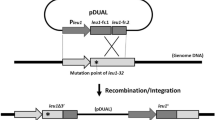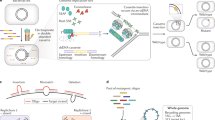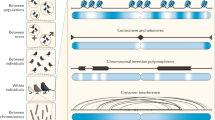Abstract
ACCORDING to the technique introduced by Lederberg1 and generally adopted, the cross between two bacterial strains differing in growth-factor deficiencies is carried out by means of mixing on “minimal medium”2 suspensions of young cultures of the two strains, which have been washed by centrifugation twice in saline. In the course of research in this Department, we observed that if instead crosses are made between the first supernatant liquids, which are usually thrown away, the ratio of prototrophs to parental cells is many times greater.
This is a preview of subscription content, access via your institution
Access options
Subscribe to this journal
Receive 51 print issues and online access
$199.00 per year
only $3.90 per issue
Buy this article
- Purchase on Springer Link
- Instant access to full article PDF
Prices may be subject to local taxes which are calculated during checkout
Similar content being viewed by others
References
Lederberg, J., Genetics, 32, 505 (1947).
For the composition of media and the meaning of symbols, see Lederberg, J., ref. 1.
Cavalli, L. L., 100th meeting of the Genetical Society (Cambridge, 1949).
Author information
Authors and Affiliations
Rights and permissions
About this article
Cite this article
MACCACARO, G., BOOTH, C. Frequency of Recombination in E. coli K 12. Nature 169, 196–197 (1952). https://doi.org/10.1038/169196a0
Issue Date:
DOI: https://doi.org/10.1038/169196a0
Comments
By submitting a comment you agree to abide by our Terms and Community Guidelines. If you find something abusive or that does not comply with our terms or guidelines please flag it as inappropriate.



